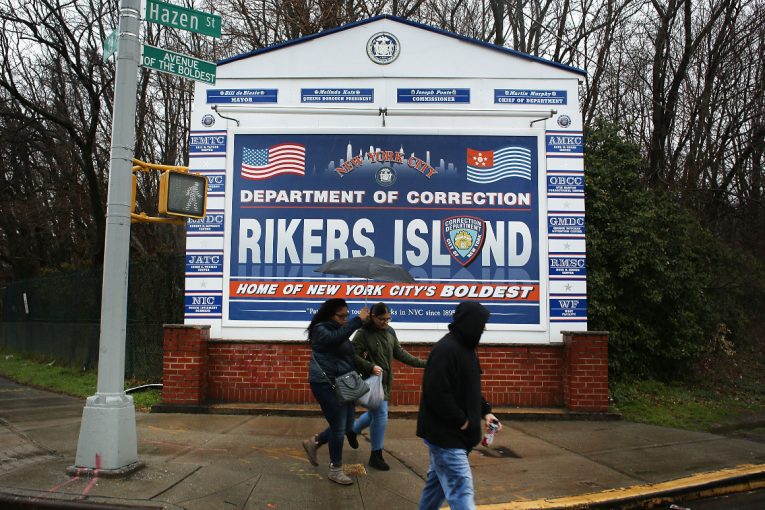

By Kritika Singh
NEW YORK— As the Rikers Island Jail Complex in New York City reaches a breaking point with overcrowding, coronavirus cases, and general sanitation problems, prison reform advocates and legal actors are taking steps to highlight and analyze the factors that are contributing to the crisis.
Although Rikers Island is often reputed as being one of the most brutal carceral institutions in the United States, conditions have become particularly worrisome in recent months. These difficulties have become especially magnified since the death of 24-year-old Stephen Khadu, who was the 12th incarcerated individual to die in city custody this year.
Khadu’s death is alleged to have been brought about by an “apparent medical problem,” but his death is still under investigation. Several of the other deaths this year were ruled to be suicides. In August, Khadu was reported to have been hospitalized due to a seizure, but his family was unable to obtain further information from jail officials. His family says they were equally shocked to hear of his death the following month.
All sides of the NY legal and judicial system have been criticized for their overlapping contributions to the crises at Rikers. Whether analyzing the recent passing of Stephen Khadu, or the horrifying treatment of Kalief Browder, who committed suicide following his three-year imprisonment at Rikers, there is the overwhelming knowledge that Rikers Jail is a dysfunctional institution. One of the primary drivers of these issues seems to be the unnecessary detention and overcrowding of prisoners at Rikers.

Much of the criticism from prison reform advocates has concerned the fact that pre-trial detainees are still being sent to the complex despite already rampant overcrowding. This trend of over-incarceration of pre-trial detainees is consistent across other New York City jails. According to data gathered by the Vera Institute for Justice from the New York City Open Data Website, as of October 8, 81.8 percent of people in New York City jails were detained pre-trial.
In fact, bail is being set more frequently and at higher rates than before the coronavirus pandemic. This trend continues despite the significant bail reform legislation passed by the New York State Legislature in 2019.
On paper, this legislation was designed to ban pre-trial detention for most misdemeanors and nonviolent felonies, and detailed the ways that setting bail for violent felonies must be established on the basis of demonstrable risk that defendants will fail to appear in court. Rather than the previous system in which cash bail was able to be administered with high degrees of judicial discretion and covert justifications, this legislation attempted to have bail set in proportion to the likelihood of fleeing prosecution.
In spite of this legislation, however, a significant number of incarcerated individuals are still sent to Rikers for pre-trial detention.
As summarized by Jullian Harris-Calvin of the Greater Justice New York program at the Vera Institute, “[Judicial actors] have a very central role in putting people into this set of facilities that are torturous and inhumane, where people are dying left and right.”
Several of the district attorneys in the city have visited Rikers and acknowledged the humanitarian crisis occurring there. Following her visit to the facility alongside Brooklyn DA Eric Gonzalez and Bronx DA Darcel Clark, Queens DA Melinda Katz noted, “We continue to review the securing orders of those who are being held at Rikers on Queens cases, with an eye toward expediting swift and just resolutions.”
Yet many advocates have criticized the lack of significant action taken to improve the situation at the jail complex. Stan Germán of the New York County Defender Services joined this criticism, saying of the situation that “You can’t acknowledge that reality and then keep sending people into that hell.” Some have gone so far as to suggest that the only truly effective solution to the crisis would be the immediate closure of the jail complex.
Many advocates have also particularly pressured distinct attorneys to consider alternative options to cash bail, such as supervised release. Supervised release allows defendants to return to their communities so long as they follow certain requirements, such as checking in with their case manager and participating in employment training.
As reported by Gotham Gazette, a recent study conducted by MDRC’s Center for Criminal Justice Research found that supervised release program participants are not more likely to miss court than defendants who had bail set and were also not rearrested at a higher rate.
The impressive efforts to decarcerate are exciting news for those striving for prison reform at Rikers Island Jail and across New York more generally. The Legal Aid Society—a New York based legal nonprofit—said in a recent statement, “The Department of Correction continues to demonstrate that it cannot house people safely…Reducing the jail population is the only way to avoid further deaths and swift action is desperately needed.”

